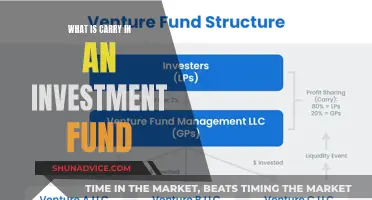
Hedge funds are classified as Collective Investment Schemes in South Africa, and they are open to members of the public to invest money or other assets. There are two types of investors: retail and qualified. Retail investors can invest as per the requirements set by the Financial Sector Conduct Authority (FSCA), while qualified investors must invest a minimum of R1 million per hedge fund and have demonstrable knowledge and experience in financial matters. Hedge funds are considered risky investments, but they can also provide high returns. They employ various investment strategies, including hedging, to offset the risk of losing money. When considering how to invest in a hedge fund in South Africa, it is important to understand the local regulations, the different types of funds available, and the associated risks and potential benefits.
| Characteristics | Values |
|---|---|
| Purpose | Increase investor returns while reducing risk |
| Strategies | Long/short equity fund, market neutral fund, multi-strategy, fixed income arbitrage, funds of funds |
| Number of Hedge Funds in South Africa | 13 local hedge funds management companies |
| Types of Investors | Retail and qualified investors |
| Retail Investor | Any investor may invest as per the requirements set out by the FSCA |
| Qualified Investor | Any person who invests a minimum of R1 million per hedge fund and who has demonstrable knowledge and experience in financial and business matters |
| Benefits | Take advantage of both rising and falling financial markets, assist in capital protection and diversification |
| Role of FSCA | Regulate and supervise hedge funds managers |
| Hedge Fund Differences | Can borrow money, use derivatives and engage in short selling |
| Hedge Fund Creation | Complicated process with considerable regulations and factors to be considered |
| Hedge Fund Staff | Must demonstrate competency by passing an exam |
| Hedge Fund Structure | Stand-alone, master/feeder, umbrella funds, segregated portfolio companies |
What You'll Learn

Understanding the different types of investors and their requirements
Hedge funds are classified as Collective Investment Schemes in South Africa, and members of the public are invited or permitted to invest money or other assets. There are two types of investors: retail and qualified investors.
Retail Investors can invest as per the requirements set out by the Financial Sector Conduct Authority (FSCA).
Qualified Investors are those who invest a minimum of 1 million Rand per hedge fund and have demonstrable knowledge and experience in financial and business matters, or have appointed a Financial Services Provider (FSP) with the necessary knowledge and experience to advise on the merits and risks of a hedge fund.
In the United States, financial regulations require that hedge funds be marketed only to institutional investors and high-net-worth individuals. These investors are often classified as Accredited Investors, who have a net worth of at least $1 million (excluding their primary residence) or an annual income of $200,000 ($300,000 for married couples).
Accredited Investors are a subset of Qualified Investors, and they have even higher asset thresholds, typically at least $5 million in investable assets.
High Net Worth Individuals (HNWIs) are those with investable assets beyond their primary residence, exceeding $1 million. Many providers set the bar at $5 million. HNWIs must have the financial means to accept higher risk and the capacity to participate at scale.
Sophisticated Investors may not have accredited wealth or income levels but possess the expertise to evaluate complex hedge fund strategies. They may have specific credentials like a Series 7 or Series 65 licence, or defined investing experience.
Institutional Investors include pension funds, endowments, insurance companies, and other entities investing on behalf of individuals or causes.
In South Africa, hedge funds are open to local investors who meet the requirements, as well as foreign investors. Foreign investment funds can register as 'foreign collective investment schemes' and be marketed publicly in the country.
Overall, the different types of investors in hedge funds are distinguished by their levels of wealth, income, expertise, and regulatory status. The eligibility criteria are designed to protect everyday investors from undue risk exposure, given the complex and risky nature of hedge fund investment strategies.
Vanguard Funds: Investing in the Future with FAANG
You may want to see also

Knowing the role of the Financial Sector Conduct Authority (FSCA)
In South Africa, hedge funds are classified as Collective Investment Schemes, which allow members of the public to invest money or other assets. The Financial Sector Conduct Authority (FSCA) is the market conduct regulator for financial institutions in South Africa. It was established by the Financial Sector Regulation Act 9 of 2017 (FSR Act) and became operational on 1 April 2018, replacing the Financial Services Board (FSB).
The FSCA plays a crucial role in regulating and supervising hedge fund managers in South Africa. Its primary objectives in this context are:
- Protecting investors: The FSCA aims to safeguard the interests of investors in hedge funds by ensuring compliance with regulations and promoting transparency.
- Risk management: The authority assists in monitoring and managing systemic risk associated with hedge funds, which often employ high-risk strategies.
- Promoting integrity and transparency: The FSCA works to uphold the integrity of the hedge fund industry and enhance transparency in its operations.
- Financial market development: The FSCA promotes the development of South Africa's financial markets by encouraging fair customer treatment, financial literacy, and financial stability.
The FSCA's role in regulating hedge funds is essential to protect investors, maintain market integrity, and promote the sustainable growth of South Africa's financial sector. The authority's oversight helps mitigate risks, ensure transparency, and foster a fair and stable environment for investors and financial institutions alike.
Fidelity's Energy Sector Fund: A Smart Investment Choice?
You may want to see also

Strategies to increase investor returns and reduce risk
Hedge funds in South Africa are classified as Collective Investment Schemes, which allow members of the public to invest money or other assets. The purpose of a hedge fund is to increase investor returns while reducing risk, regardless of market performance.
Long/Short Equity Fund
This strategy involves taking long positions in stocks expected to increase in value and short positions in stocks expected to decrease in value. This approach can help reduce overall market risk while potentially profiting from both rising and falling markets.
Market Neutral Fund
Market neutral funds aim to eliminate market risk by taking offsetting long and short positions in various stocks or sectors. The goal is to profit from stock-specific or sector-specific movements rather than overall market direction.
Multi-Strategy
As the name suggests, this approach involves employing multiple strategies simultaneously. Hedge fund managers may use a combination of long/short equity, arbitrage, event-driven, or relative value strategies to increase returns and reduce risk.
Fixed Income Arbitrage
This strategy focuses on exploiting price differentials in fixed-income securities, such as bonds. Hedge fund managers may take advantage of mispricing between similar securities or benefit from interest rate changes by going long or short on specific bonds.
Funds of Funds
Funds of funds involve investing in multiple hedge funds to diversify risk. By allocating capital across various hedge funds with different strategies and managers, the risk of significant losses from a single fund is reduced.
Hedging
Hedging is a key risk management technique used by hedge funds. It involves taking an opposite position in a related asset to offset the risk of losing money. For example, a hedge fund might use derivatives to hedge against potential losses in their portfolio.
Risk Management and Diversification
Hedge funds can employ robust risk management frameworks, including stress testing and scenario analysis, to identify and mitigate potential risks. Additionally, by diversifying their investments across various asset classes, sectors, and geographies, hedge funds can reduce the impact of losses in any single investment.
Due Diligence and Manager Selection
Conducting thorough due diligence on hedge fund managers is essential. Investors should assess the manager's track record, investment strategy, risk management capabilities, and regulatory compliance. Selecting experienced and reputable managers can help increase returns and reduce the risk of fraud or mismanagement.
Regulatory Compliance and Transparency
Hedge funds should comply with local regulations and adhere to transparency requirements. In South Africa, the Financial Sector Conduct Authority (FSCA) regulates hedge fund management companies. Investing with compliant and transparent hedge funds can help protect investor interests and reduce the risk of fraud.
It is important to note that investing in hedge funds carries risks, and investors should carefully consider their investment goals, risk tolerance, and conduct thorough research before investing.
Best American Funds to Invest in Today
You may want to see also

How to structure a hedge fund
The structure of a hedge fund is determined by the types of investors it wishes to work with and their needs, such as tax status, voting rights, and the ability to use leverage. There are typically three main structures that dominate the hedge fund sector: stand-alone, master/feeder or umbrella funds, and segregated portfolio companies.
A stand-alone structure operates as a single fund, selling shares to investors. On the other hand, segregated structures are treated as separate legal entities, with each investor having a separate fund account with its own assets and liabilities.
Master/feeder or umbrella structures are a middle ground between the two extremes. They are used when the requirements of each investor differ, such as in tax status or leverage restrictions. This structure involves creating separate feeder accounts for each investor, which feed into the master fund that trades on behalf of the separate funds.
Hedge funds are usually structured as an offshore corporation, limited partnership, or limited liability company. The fund is managed by an investment manager, an organisation or company that is legally and financially distinct from the hedge fund and its portfolio of assets. Many investment managers use service providers for operational support, such as prime brokers, banks, administrators, distributors, and accounting firms.
Mutual Fund Strategies: Long-Term Investments for Financial Freedom
You may want to see also

How to manage a hedge fund
Hedge funds are classified as Collective Investment Schemes in South Africa, and their purpose is to increase investor returns while reducing risk. Managing a hedge fund is a complex process that requires careful adherence to regulations and strategic investment decisions. Here are some key aspects of how to manage a hedge fund:
Understanding Regulations
Before establishing a hedge fund in South Africa, it is crucial to comprehend the rules and regulations set by the Financial Sector Conduct Authority (FSCA). The FSCA regulates and supervises hedge fund managers with specific objectives, including protecting investors, managing systemic risk, and enhancing transparency. Familiarity with these regulations is essential for compliance and risk management.
Investor Types and Requirements
In South Africa, there are two types of investors in hedge funds: retail and qualified investors. Retail investors can invest in hedge funds without restrictions. On the other hand, qualified investors are individuals who invest a minimum of R1 million per hedge fund and have demonstrable knowledge and experience in financial and business matters. As a hedge fund manager, understanding these investor types is crucial for client engagement and compliance with FSCA requirements.
Investment Strategies
Hedge funds employ various investment strategies to generate active returns. These strategies include long/short equity funds, market neutral funds, multi-strategy approaches, fixed-income arbitrage, and funds of funds. Hedge fund managers must be adept at utilising these strategies to enhance returns while managing risk effectively.
Risk Management
Given the high-risk nature of hedge fund investments, risk management is a critical aspect of fund management. Hedge funds often use 'hedging' to offset the risk of losing money by taking opposite positions in related assets. Additionally, managers must implement stress testing, back testing, and scenario analysis to identify and mitigate potential risks effectively.
Operational Considerations
When managing a hedge fund, it is essential to appoint a competent investment team, including administrators, independent auditors, custodians, prime brokers, legal counsel, and tax advisors. These professionals form the fund's providers and are responsible for its day-to-day operations and compliance with regulations.
Disclosure and Reporting
Hedge fund managers have specific disclosure and reporting obligations to investors and the FSCA. Before investing, managers must provide potential investors with detailed information about the fund, investment strategies, risks, fees, and other relevant details. Regular reporting to investors and the FSCA is also required to maintain transparency and compliance with regulations.
Structure and Establishment
The structure of a hedge fund depends on the types of investors it targets and their needs, such as tax status and leverage restrictions. Common structures include stand-alone, master/feeder, and segregated portfolio structures. Understanding these structures and their implications is vital for effective fund management and meeting investor expectations.
Axis Mutual Fund: Invest Directly with Ease
You may want to see also







